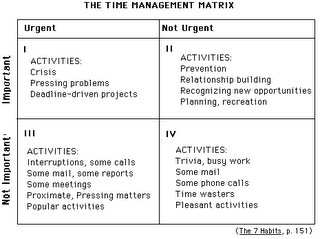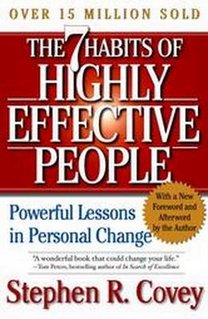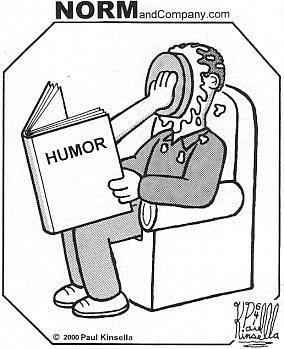 The exercise of all the other habits prepares us for the habit of synergy. Simply defined, synergy means that the whole is greater than the sum of its parts. The essence of synergy is to value differences - to respect them, to build on strengths, and to compensate for weaknesses.
The exercise of all the other habits prepares us for the habit of synergy. Simply defined, synergy means that the whole is greater than the sum of its parts. The essence of synergy is to value differences - to respect them, to build on strengths, and to compensate for weaknesses.Many people have not really experienced even a moderate degree of synergy. They have been trained to fight for themselves, and be defensive and protective in communication and interaction.
Synergy is effective because it gets the most out of everyone, instead of one or two people leading, with the others feeling like their opinions haven't really been considered. A good attitude to have when thinking of synergy is this: If a person you are dealing with disagrees with you, then there must be something they see that you do not, and you should seek to understand what they are thinking. They have a perspective, a frame of reference that you need to look at.
Negative Synergy
When we run into negative synergy, we see things like politicking, back-stabbing, rivalry, second guessing, etc. It is like trying to drive down the road with one foot on the gas, and one on the break. And then as we continue and try to move forward, we try and give it more gas before we slow down and consider taking off the brake.
Levels of Communication
There are 3 basic levels of communication:
The lowest form of communication comes from low-trust, low cooperation atmospheres. When the situation is like this, the general result is people being defensive, and the end result is a Win/Lose or Lose/Win situation. A few people get their way, most don't, and everyone walks out frustrated.
The middle form of communication is respectful communication. People are fairly mature and will listen to each other's ideas. They communicate politely, but not empathically. This usually ends in people not really understanding where each other are coming from, and a compromise is met. No one walks away fully happy, but something was accomplished, just not the best.
The third level is where we meet synergy. The synerginistic position of high trust produces better solutions than originally proposed. The high cooperation allows people to give an idea, and allow it to be constructively critiqued, so that every has a say, and the end result is mutually agreeable and better than the original.
An important part of synergy is valuing the differences. This means we understand that all people see the world, but from a different perspective. This is where people see their own limitations and shortcomings, and values what others have to say in those areas. When you become aware that someone sees something differently, you say, "Good! Help me see it how you see it!"
We need to understand that life is not always a dichotomous either/or, but there are always third alternatives.
---
As always, I cannot include each and every example and illustration the author uses. It seems to me though that the best way to learn about synergy is not to read about it, but to experience it.












 Final Score: Leafs 3, Habs 2. Leaf goals by Allison, and Lindros (2). As you can see in the penalty summary the Leafs ended the game with McCabe in the box. The last few seconds were so frantic as the Habs also pulled their goalie so the last 25 seconds were 6-4. Luckily for us Eddie the Eagle came up big. I love that guy!
Final Score: Leafs 3, Habs 2. Leaf goals by Allison, and Lindros (2). As you can see in the penalty summary the Leafs ended the game with McCabe in the box. The last few seconds were so frantic as the Habs also pulled their goalie so the last 25 seconds were 6-4. Luckily for us Eddie the Eagle came up big. I love that guy!














